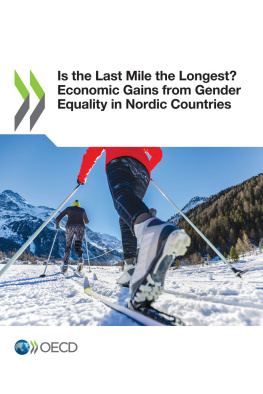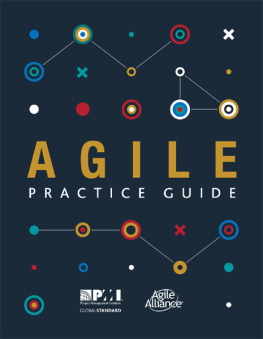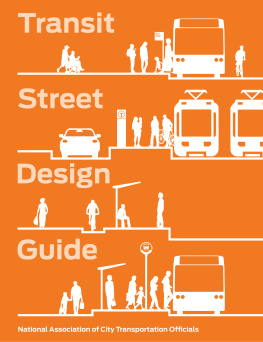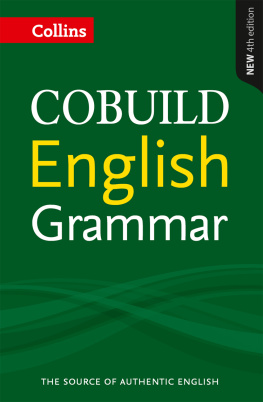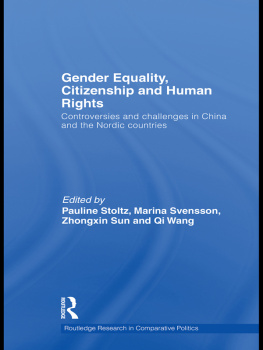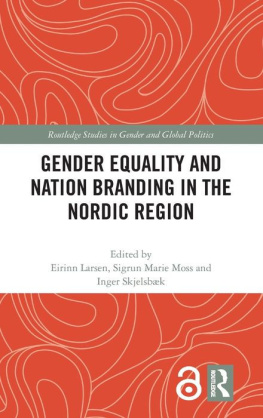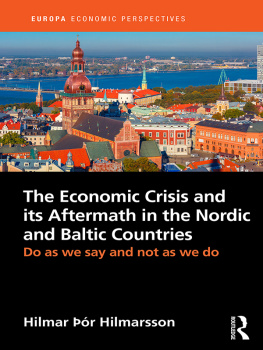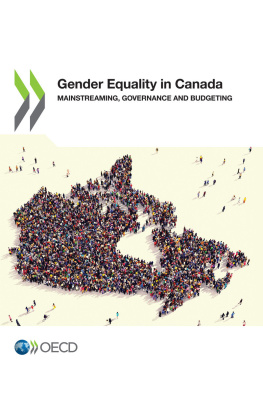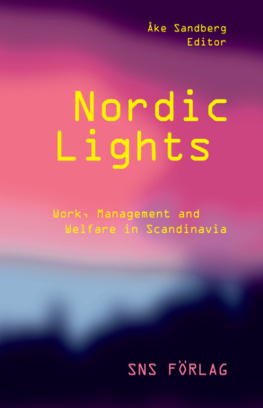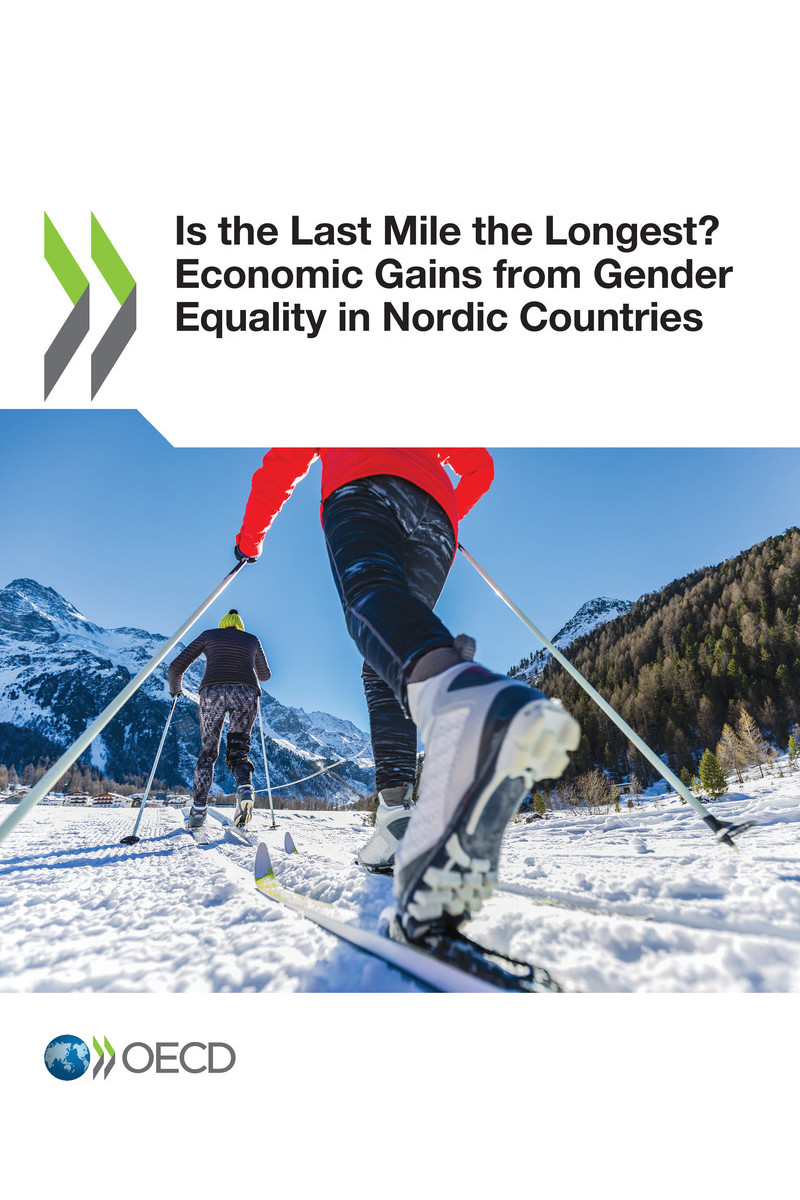Is the Last Mile the Longest? Economic Gains from Gender Equality in Nordic Countries
Please cite this publication as:
OECD (2018), Is the Last Mile the Longest? Economic Gains from Gender Equality in Nordic Countries , OECD Publishing, Paris.
http://dx.doi.org/10.1787/9789264300040-en
Metadata, Legal and Rights
ISBN: 978-92-64-30003-3 (print) - 978-92-64-30004-0 (pdf) - 978-92-64-30217-4 (HTML) - 978-92-64-30216-7 (epub)
DOI: http://dx.doi.org/10.1787/9789264300040-en
This work is published under the responsibility of the Secretary-General of the OECD. The opinions expressed and arguments employed herein do not necessarily reflect the official views of OECD member countries.
This document, as well as any data and any map included herein, are without prejudice to the status of or sovereignty over any territory, to the delimitation of international frontiers and boundaries and to the name of any territory, city or area.
The statistical data for Israel are supplied by and under the responsibility of the relevant Israeli authorities. The use of such data by the OECD is without prejudice to the status of the Golan Heights, East Jerusalem and Israeli settlements in the West Bank under the terms of international law.
Photo credits: Cover gorillaimages/Shutterstock.com.
Corrigenda to OECD publications may be found on line at: www.oecd.org/publishing/corrigenda .
OECD 2018
You can copy, download or print OECD content for your own use, and you can include excerpts from OECD publications, databases and multimedia products in your own documents, presentations, blogs, websites and teaching materials, provided that suitable acknowledgement of OECD as source and copyright owner is given. All requests for public or commercial use and translation rights should be submitted to .
Preface
Gender equality is both a fundamental human right and a key driver of inclusive growth. Over the past five years, OECD countries have made some progress in getting closer to gender equality goals. The 2013 OECD Recommendation of the Council on Gender Equality in Education, Employment and Entrepreneurship followed in 2015 by the OECD Recommendation of the Council on Gender Equality in Public Life have provided clear and actionable guidelines to support these efforts. However, gender gaps persist in all areas of social and economic life, as the 2017 OECD report The Pursuit of Gender Equality: An Uphill Battle , showed.
The Nordic countries Denmark, Finland, Iceland, Norway and Sweden have moved further along the path to gender equality than most OECD countries. This report provides ample evidence that increases in womens economic participation in the Nordic countries have greatly benefited economic growth. Indeed, in Denmark, Iceland, Norway and Sweden, increases in womens employment alone accounted for the equivalent of about 10-20% of average annual GDP per capita growth over the past 40-50 years.
The striking feature of the Nordic countries is that they managed to increase and/or sustain female employment rates that were already high even as early as the early-1970s. The long-standing commitment to gender equality at work in Nordic countries has yielded results. Today, gender employment gaps in the Nordic countries are among the OECDs lowest and couples tend to share paid and unpaid work more equally than in most other OECD countries.
The design of gender and work-life balance policies in individual Nordic countries may vary, but they are united by a common policy objective to engage men and women equally in the labour market. With the launch of their initiative Nordic Solutions to Global Challenges in 2017, the five Nordic Prime Ministers expressed their commitment to close gender gaps at home and to share the regions experiences in investing in gender equality and generous work-life policies, which contributed to the development of this report.
Nordic countries are closer to eliminating gender labour market gaps than most, but closing completely the stubborn gaps that remain in areas such as pay and representation in management positions may well turn out to be a difficult challenge. Completing the last mile on the path to gender equality would not only bring further economic and social gains to the Nordic countries but also provide important lessons for policy development across the OECD and beyond.

Angel Gurra, Secretary-General of the OECD

Dagfinn Hybrten, Secretary-General of the Nordic Council of Ministers
Acknowledgements
The report was prepared under the overall supervision of the OECD Secretary-General, Angel Gurra, and the OECD Chief of Staff and Sherpa to the G20, Gabriela Ramos.
The OECD Directorate for Employment, Labour, and Social Affairs (ELS) prepared this report under the senior leadership of Stefano Scarpetta (Director of ELS), Mark Pearson (Deputy Director of ELS) and Monika Queisser (Senior Counsellor, Head of the OECD Social Policy Division and leader of the OECD Horizontal Project on Gender Equality).
The report was written by Willem Adema and Chris Clarke (OECD Social Policy Division). Ulf Andreasson, Truls Stende and Line Christmas Moeller (Nordic Council of Ministers) and Valerie Frey, Mark Keese and Olivier Thvenon (OECD Directorate for Employment, Labour, and Social Affairs) commented on earlier drafts and contributed throughout the preparation process. Liv Gudmundson prepared the report for publication, with Lucy Hulett and Alastair Wood providing further logistical, publication and communications support.
The financial support provided by the Nordic Council of Ministers for this report is gratefully acknowledged.
Abbreviations and acronyms
AMECO
Annual macroeconomic database of the European Commission
ECEC
Early childhood education and care
EIGE
European Institute for Gender Equality
GDP
Gross domestic product
ICT
Information and communication technology
ILO
International Labour Organization
ISCED
International Standard Classification of Education
ISCO
International Standard Classification of Occupations
LFP
Labour force participation
NEET
Not in employment, education or training
NIKK
Nordic Information on Gender
NOSOSCO
The Nordic Social Statistical Committee
OSH
Out-of-school-hours care
PISA
Programme for International Student Assessment
PPP
Purchasing power parity
PLC
Public limited company
SOE
State-owned enterprise

